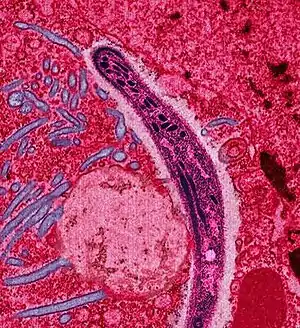Parasitic disease
A parasitic disease, also known as parasitosis, is an infectious disease caused or transmitted by a parasite. Many parasites do not cause diseases as it may eventually lead to death of both organism and host. Parasites infecting human beings are called human parasites. Parasitic diseases can affect practically all living organisms, including plants and mammals. The study of parasitic diseases is called parasitology.
| Parasitic disease | |
|---|---|
| Other names | parasitosis, parasitic infection |
 | |
| False-color electron micrograph of a Plasmodium sporozoite. | |
| Specialty | Infectious disease |
Some parasites like Toxoplasma gondii and Plasmodium spp. can cause disease directly, but other organisms can cause disease by the toxins that they produce.[1]
Signs and symptoms
Symptoms of parasites may not always be obvious. However, such symptoms may mimic anemia or a hormone deficiency.[2] Some of the symptoms caused by several worm infestations can include itching affecting the anus or the vaginal area, abdominal pain, weight loss, increased appetite, bowel obstructions, diarrhea, and vomiting eventually leading to dehydration, sleeping problems, worms present in the vomit or stools, anemia, aching muscles or joints, general malaise, allergies, fatigue, and nervousness. Symptoms may also be confused with pneumonia or food poisoning.[3]
The effects caused by parasitic diseases range from mild discomfort to death. The nematode parasites Necator americanus and Ancylostoma duodenale cause human hookworm infection, which leads to anaemia, protein malnutrition and, in severely malnourished people, shortness of breath and weakness.[4] This infection affects approximately 740 million people in the developing countries, including children and adults, of the tropics specifically in poor rural areas located in sub-Saharan Africa, Latin America, Southeast Asia and China. Chronic hookworm in children leads to impaired physical and intellectual development, school performance and attendance are reduced. Pregnant women affected by a hookworm infection can also develop anemia, which results in negative outcomes both for the mother and the infant. Some of them are: low birth weight, impaired milk production, as well as increased risk of death for the mother and the baby.[5]
Causes
Mammals can get parasites from contaminated food or water, bug bites, or sexual contact. Ingestion of contaminated water can produce Giardia infections.[6]
Parasites normally enter the body through the skin or mouth. Close contact with pets can lead to parasite infestation as dogs and cats are host to many parasites.
Other risks that can lead people to acquire parasites are walking with barefeet, inadequate disposal of feces, lack of hygiene, close contact with someone carrying specific parasites, and eating undercooked foods, unwashed fruits and vegetables or foods from contaminated regions.
Parasites can also be transferred to their host by the bite of an insect vector, i.e. mosquito, bed bug, fleas.
Treatment
Parasitic infections can usually be treated with antiparasitic drugs.
Albendazole and mebendazole have been the treatments administered to entire populations to control hookworm infection. However, it is a costly option and both children and adults become reinfected within a few months after deparasitation occurs, raising concerns because the treatment has to repeatedly be administered and drug resistance may occur.[7]
Another medication administered to kill worm infections has been pyrantel pamoate. For some parasitic diseases, there is no treatment and, in the case of serious symptoms, medication intended to kill the parasite is administered, whereas, in other cases, symptom relief options are used.[8] Recent papers have also proposed the use of viruses to treat infections caused by protozoa.[9][10]
Terminology
Although organisms such as bacteria function as parasites, the usage of the term "parasitic disease" is usually more restricted. The three main types of organisms causing these conditions are protozoa (causing protozoan infection), helminths (helminthiasis), and ectoparasites.[11] Protozoa and helminths are usually endoparasites (usually living inside the body of the host), while ectoparasites usually live on the surface of the host. Protozoa are single-celled, microscopic organisms that belong to the kingdom Protista.[12] Helminths on the other hand are macroscopic, multicellular organisms that belong to the kingdom Animalia.[12] Protozoans obtain their required nutrients through pinocytosis and phagocytosis.[12] Helminths of class Cestoidea and Trematoda absorb nutrients, whereas nematodes obtain needed nourishment through ingestion.[12] Occasionally the definition of "parasitic disease" is restricted to diseases due to endoparasites.[13]
References
- Jones D, Wache S, Chhokar V (1996). "Toxins produced by arthropod parasites: salivary gland proteins of human body lice and venom proteins of chelonine wasps". Toxicon. 34 (11–12): 1421–9. doi:10.1016/s0041-0101(96)00091-8. PMID 9027999.
- "Parasite Infection and Parasite Treatment". Retrieved 2010-07-07.
- "Parasitic Diseases". Retrieved 2010-07-07.
- Harrison's manual of medicine. Harrison, Tinsley Randolph, 1900-1978., Kasper, Dennis L.,, Longo, Dan L. (Dan Louis), 1949-, Fauci, Anthony S., 1940-, Hauser, Stephen L.,, Jameson, J. Larry (19th ed.). New York. 2016-05-22. ISBN 9780071828543. OCLC 930026813.CS1 maint: others (link)
- "Hookworm disease". Retrieved 2010-07-07.
- "Parasitic Diseases". Retrieved 2010-07-07.
- "Disease Burden". Retrieved 2010-07-07.
- "Parasitic diseases". Retrieved 2010-07-07.
- Keen, E. C. (2013). "Beyond phage therapy: Virotherapy of protozoal diseases". Future Microbiology. 8 (7): 821–823. doi:10.2217/FMB.13.48. PMID 23841627.
- Hyman, P.; Atterbury, R.; Barrow, P. (2013). "Fleas and smaller fleas: Virotherapy for parasite infections". Trends in Microbiology. 21 (5): 215–220. doi:10.1016/j.tim.2013.02.006. PMID 23540830.
- "About Parasites | CDC DPD". 2020-01-28.
- Sherris medical microbiology. Ryan, Kenneth J. (Kenneth James), 1940- (Seventh ed.). New York. 2018-01-12. ISBN 9781259859816. OCLC 1004770160.CS1 maint: others (link)
- "Intestinal Protozoal Diseases: eMedicine Pediatrics: General Medicine". Retrieved 2010-04-25.